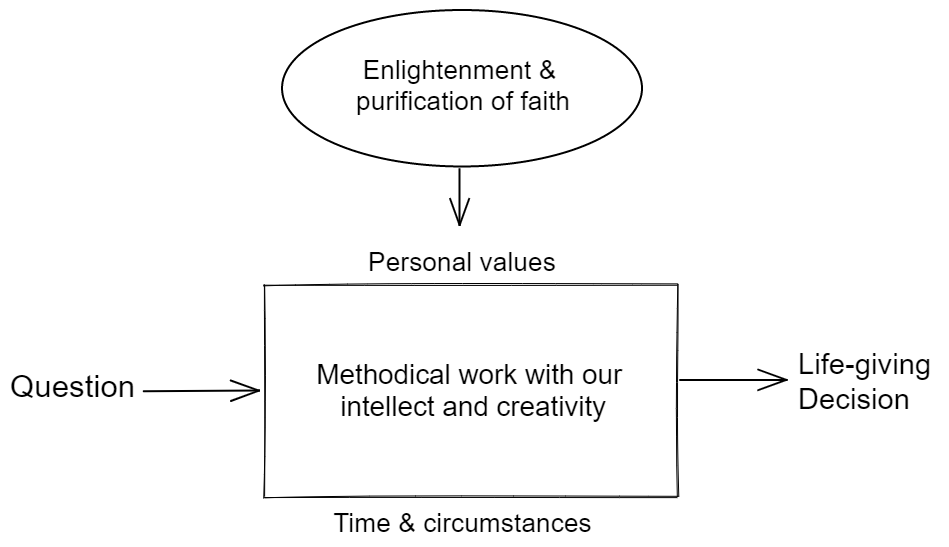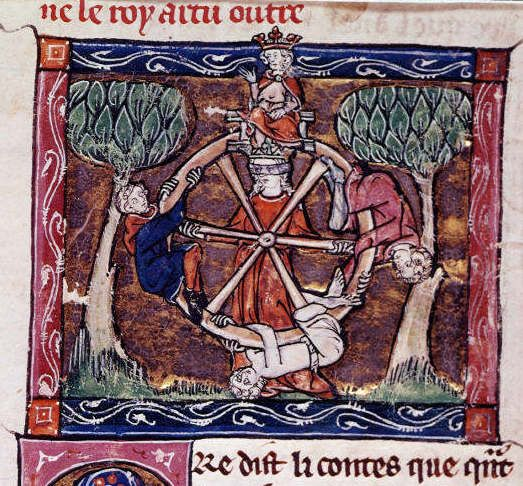Discernment
# Reference
- Source: Atlas/Maps/DLQ 10 MOC
- Keywords: Cards/permanent notes
- Relevant Notes:
- Module 1A
- Cards/Problem versus Mystery: God is the ultimate mystery.
- Cards/Absolute Certainty versus Wonder:
- Cards/Order and Chaos
- Cards/Perfectionism
- Cards/Desire
- Module 1B
- Cards/The First Principle and Foundation
- Cards/Consolation: one of discernment’s movements
- Cards/Desolation: one of discernment’s movements
- Cards/Disordered attachments
- Module 2
- Module 1A
# Notes
# Introduction to Discernment
- Discernment: ==right judgement==. The ability to distinguish what is authentically good from what is only apparently good.
- You do not discern between something that is clearly good and clearly evil (extremes of the moral spectrum).
- We discern with competing goods.
- Pagkilatis: the Filipino word for discernment.
- Comes from the Spanish wood kirates: when a jeweler is trying to distinguish the authenticity of a diamond
- Discernment is not just a matter of the mind (comparing pros and cons is not enough). Make sure you ==listen to your heart too.==
- The heart is the seat of your emotions. But it is also so much more than that.
- The heart is your core.
- It is closer to what we know as your ==soul/essence==.
- Here, you will find the seat of your values…what we consider important.
- We see its value in our mind, in our experiences.
- So pay attention to time and circumstances.
- Your emotions could be ==possible reactions== to your values.
- The ==tools== you need in discernment are the head and heart, which both have to work together. But ==factors we cannot control==, such as time and circumstances, bind our discernment.
The General Structure of Discernment from Pierre-Wolf’s Sources/The Components of Any Choice)

Notes:
- A question could be external, internal, or retrospective
- A decision is considered good if it enables you to live better
- Methodical work: the importance of paying attention to data (through journalling) and how it makes you feel
- Wondering why certain events make you feel things points you to your values
- On faith’s influence: We discern with our values, and faith (as a transcendent source) offers a certain set of values that we can use.
- Faith shapes your values, which in turn shape your discernment.
- How does this apply to a secular context?
- Everyone believes that human beings have dignity.
- Christians interpret this as God’s love for us (see Sources/Being the Beloved)
- If you love from a point of abundance…it comes from knowing that you have always been loved.
- On the other hand, if you love from a point of scarcity…you will always be treating your relationships transactionally
- Summary: LOOK -> FEEL -> PONDER
# Role of faith in discernment
- Theory: People aren’t really angry at God; they’re actually angry at how it’s presented to us.
- Religion may be divinely inspired, but it is also humanly constructed.
- 2 questions:
- Is the way we live out our faith appropriate to the state of our life now?
- What image of God do we still hold today?
- 2 lessons about God from St. Thomas Aquinas (See Sources/The Flying Spaghetti Monster, Aristotle, and Fernando Amorsolo):
- God is not a being
- God is the condition of possibility that enables all other beings to exist
- Ipsum Esse Subsistens: subsistent being itself.
- Described as an act
- What we may often hear from loved ones: “I want what is best for you”
- But how do we really know what’s best for the one we love?
- Reality: We tend to impose our desire on the one we love.
- Is that really what is best for them?
- God does not impose his will.
- It’s real love when you choose to commit…you’re not forced to do it.
- “The will of God”
- There’s no blueprint.
- Important thought: the will of God is not imposed on us from high above, but is often something we discover from deep within.
- So how can we perceive God’s will? We need to examine our deepest life-giving desires. (Connected to Cards/Desire)
- If our life is a building…we can see desires as the raw material for discernment, and our head and heart as the tools we used to shape these desires.
- When people say “This is God’s plan for you”, they’re trying to perceive something we cannot.
- God is the epitome of a mystery. Cards/Problem versus Mystery
- They’re trying to cope with the chaos of life by assuming order. Cards/Order and Chaos
- This shows an absolutely certain mindset; it’s better to approach God from a place of wonder. Cards/Absolute Certainty versus Wonder
# Good & Evil
- Good and evil are typically assumed to be 2 equal and opposing forces.
- However, according to St. Thomas Aquinas, it doesn’t work that way. He believed that all there is good.
- Allows for complementarities; see Sources/The Need for Certainty and Cards/Order and Chaos
- In line with this, his definition of evil was the “privation of the good”. (Remember: Evil is the privation of the good)
- It can be seen as an incomplete circle: a lack of what is supposed to be good
- E.G. money being privatized so that others have a lack
- Thus, whenever we do evil, we actually see it as good, even if it’s done in a mistaken way.
- Connected to Cards/Desire: The will desires. (e.g. “I will teach, study, etc.”). But desire can lead us to evil, even if it appears good.
- The will is faculty of desire.
- ^ Discernment helps us avoid this.
- A lack of good = a lack of ==energy/willpower.==
- One of the things that reinforces laziness is when you overthink about it.
- If you pay attention to your good desires, how can they be opposed to God?
- Just because it came from you doesn’t mean it’s against God
# Ignatian Discernment
St. Ignatius of Loyola perceived discernment as the ability to see God’s will in one’s life.
So if God’s will is perceived through our deepest life-giving desires…
- This refers to our holy desires
- Does not mean “pious and out of this world”
- Holy comes from the word whole
- Thus, ==holy desires are the ones that make us whole==
- This refers to our holy desires
Ignatian Spirituality: a spirituality of desire. (See Cards/Desire)
- St. Ignatius of Loyola believed – and this belief lies at the heart of Ignatian Spirituality – that our truest desires reflect God’s desires in us and for us.
We need to distinguish our surface wants from our deep desires.
- This can be difficult though…like distinguishing M&M’s and Skittles, or distinguishing water and vodka.
We need to learn how to test our desires. This is exactly what discernment is for: to test which of our desires are authentically good, and which ones are only apprently good.
- Urges are on the ==physical level== (reactive/surface, while desires are deeper , being on the ==realm of value==
Surface Wants Deep Desires My desire leads me to become selfish My desire leads me to a healthier self My desires disenages me from the needs of others My desire enables me to be more available to others My desire is governed by fear My desire is driven by love
- Urges are on the ==physical level== (reactive/surface, while desires are deeper , being on the ==realm of value==
St. Ignatius of Loyola’s greatest contribution: Sources/The Spiritual Exercises
- Full form: 30-day retreat where you give yourself to God
- Begins with Cards/The First Principle and Foundation, where you articulate the ultimate goal of your life
- Remember: Our deepest, most life-giivng desires are God’s desires for us.
- St. Iraneus: "Cards/Gloria dei vivens homo" (“The glory of God is the human person fully alive.”)
# How do I know I’m on the right path in discernment?
- Ask yourself: Are you at peace with your decision?
- What being at peace looks like: a stability and sernity the comes from a sense of rightness
- Note: this does not use the word “happy”…
- …because sometimes we now that the right decision is also the difficult decision…
- …and that serenity and stability don’t come right away
- The goal of discernment is peace.
- What being at peace looks like: a stability and sernity the comes from a sense of rightness
- So how can you tell if you’re at peace? Through 2 movements in discernment: Cards/Consolation and Cards/Desolation
- Important notes: ^6b4c48
- Cards/Consolation and Cards/Desolation are interior movements. They are felt, but they are more than just emotions.
- Sometimes the right decision can be accompanied by initial feelings of sadness and doubt, and the wrong decision may start with feelings of happiness and clarity.
- Thus, it is important to pay attention to the ==long-term trajectory==
# Indifference
- In the Ignatian sense, indifference means looking at your decisions from a fresh and balanced perspective
- Balacing Cards/Order and Chaos
- Ignatian Indifference: maintaining a vision of the whole
- Settling one’s life in balance before all created things
- Note: the heart of our attachments is a distinct Cards/Brokenness in our character
- There is indeed a difference between happiness and joy.
| Happiness | Joy |
|---|---|
| It is an emotional state (therefore fleeting). It relies on one or more multiple things and times. It does not need to have any deeper meaning. | An abiding sense of peace that one’s life is meaningful |
- Happiness
- Happiness is monetary bliss.
- Take for instance, The Wheel of Fortune. This image is used to describe life (as full of up and down days). It shows us that you can easily lose the things that make you happy.

- Happiness: ==living your life on the edge of the wheel== (at its most unstable)
- The things that can make us happy can also make us miserable too.
- RECALL: Attachment and Cards/Desolation
- This can be seen in the temptation to overwork during your early 20’s. Remember that there’s more to life than your job.
- This is why it is important to have a holistic view of what makes your life meaningful.
- Isn’t it strange that those whose who have everything are not necessarily happy?
- Takeaway: It’s possible to life a “happy” life that is ==meaningless.==
- Joy
- Joy can happen even amid the ==absence of happiness== and the ==presence of sorrow.==
- RECALL: Detachment and Cards/Consolation
- While happiness is a fleeting emotion, joy is a stable state.
- Remember: Cards/Gloria dei vivens homo
- Live your life at the center of the wheel rather than its edges.
- Counterpoint to the Wheel of Fortune: The Rose Window, which places Jesus at the center

- “Discard everything that does not spark joy”
- Counterpoint to the Wheel of Fortune: The Rose Window, which places Jesus at the center
- Good discernment leads to a life of joy.
- Joy can happen even amid the ==absence of happiness== and the ==presence of sorrow.==